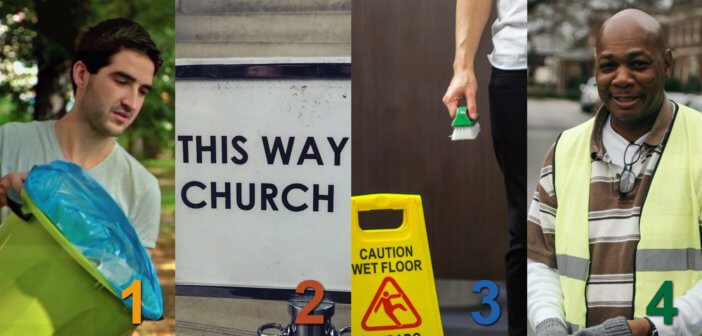Lovett Weems reminds us that visitors often form a first impression of a church based on the appearance of the areas they first encounter, such as the parking lot, entry, and restrooms. He recommends four steps to assess and improve the message sent to newcomers by the condition of your facilities.
Do you remember what it was like to go to a church for the first time? Many church buildings are an impenetrable labyrinth to someone new. Other buildings send the signal that nothing new or exciting has happened here in decades.
Visitors form a first impression of your church before they ever cross the threshold of your sanctuary. Does the exterior appearance of your church signal that things are going on? Are there yard signs and banners? Is any play area well kept and safe? Is the landscaping well tended? Are there cars in the parking lot? Lights on in the evening? These things indicate that the church is alive and are a means of welcoming and informing those approaching the church or just driving by.
Remember, these things probably matter more to newcomers at this point than they ever will again. Chances are that your building and property need to put a more welcoming face forward. A building is not an end itn itself, but it can either help or hurt your mission of reaching and serving others in the name of Christ.
1. Declutter your church.
Does your church need a dumpster? Many churches are filled with clutter. One place to begin is the entrance that first-time guests most use. Often this area becomes a magnet for clutter. It’s filled with all the things that may accumulate around your home but that you would never leave out when expecting guests. Clutter multiplies so get on top of it quickly. A workday can help, but what’s most needed is a new mindset and practices to ensure that clutter is routinely removed and out of date materials come down immediately.
2. Audit all signage.
Signage can easily become inadequate or out of date since regular members pay little attention to signage or its absence. They don’t need the signs. They already know where they are going! It is critical that both external and internal signage be attractive and functional. Don’t make people guess where they need to go. They are already nervous. Be generous with signage. New people will pay close attention, and longtime members may never notice the signs are there. Ask relatively new participants or even persons not in your church to help by walking into and through your church and make their lists of what signs are needed and where those signs would be most helpful. And be sure to use simple language rather than words that may be unclear to newcomers.
3. Pay attention to areas of special importance to visitors.
Some areas are of special importance to new people. Pay special attention to places where people first enter and to restrooms and nursery area. Make sure they are in good condition and then make sure they are checked before services to make sure everything is in order. Missing supplies in a restroom may have no connection to the spiritual vitality of your congregation, but they certainly will leave visitors with an impression about your church.
4. Check the parking areas.
The parking areas send early signals about whether you are expecting guests and, if so, have you prepared for their arrival. Marking spaces closest to the entrances “reserved for visitors” not only assures that your visitors will have a place to park – it signals that you expect and welcome visitors. Ask church staff and officers to park in the most distant spaces so that visitors can easily find convenient parking. Make sure it is clear how to get from the lot to the worship space, nursery, restrooms, and welcome center.
Increasingly churches begin their hospitality in the parking area using parking attendants and greeters. They can monitor spaces and direct people to available parking, give directions, and help people when needed and appropriate, especially when the weather is bad.
Here’s a fun exercise you might try. Someone said that every church, based on its appearance and upkeep, has a date stamped on it. It might be 1970, 1985, or 2000. What date does your church communicate? Use this exercise with groups to begin conversations about your facilities.
Remember that your facilities send messages. What messages do your buildings and grounds send?
Related Resources
- Be The Welcoming Church Video Tool Kit
- First Impressions Are Formed Earlier Than You Think by Kay Kotan and Blake Bradford
- Is Your Parking Lot Helping or Hurting Your Church? by Rich Birch






